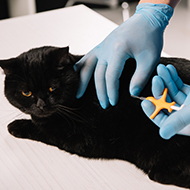
BVA urges officials to further consider complexities
The UK Government is seeking the views of veterinary professionals, pet owners and members of the public for a public consultation on proposals for compulsory cat microchipping.
The eight-week consultation has been launched in response to a previous call for evidence, which showed that 99 per cent of respondents supported microchipping cats.
Compulsory microchipping for dogs was introduced in 2016 and, according to Defra, around nine million dogs are now microchipped.
A report from Cats Protection estimates that 2.6 million cats will benefit from the new measures, allowing for thousands of displaced cats to be reunited with their owners more quickly.
Animal welfare minister Lord Goldsmith said: “It is hugely important that cats and kittens are microchipped as this is often the only hope owners have of seeing their lost cat returned safely to their home.
“These plans to make cat microchipping compulsory build on our actions to improve our already world leading animal welfare standards, including taking steps to end live animal exports and ban the practice of keeping primates as pets.”
In it's response to the news, the British Veterinary Association (BVA) urged the Government to address the difficulties caused by national databases and to consider the more complex side of microchipping such as management of feral cat populations.
BVA senior vice president Daniella Dos Santos commented: “Campaigns to introduce compulsory microchip scanning deliver attractive headlines but fail to recognise that the implementation is complex. Vets’ primary role must be in providing veterinary care for animals and they should not be put in the position of policing the law or untangling ownership disputes, which could result in people not seeking veterinary treatment.
“We know that the headline policies will be popular, but we urge the government to work through the detail before committing to something that is at best unworkable and at worst detrimental to animal welfare.”



 The Veterinary Medicines Directorate (VMD) is inviting applications from veterinary students to attend a one-week extramural studies (EMS) placement in July 2026.
The Veterinary Medicines Directorate (VMD) is inviting applications from veterinary students to attend a one-week extramural studies (EMS) placement in July 2026.